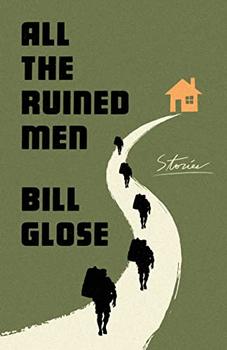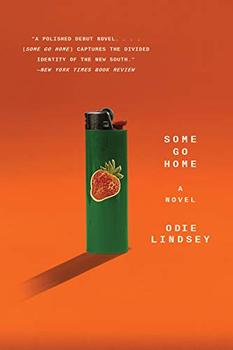Summary | Excerpt | Reading Guide | Reviews | Beyond the book | Read-Alikes | Genres & Themes | Author Bio

Stories
by Bill Glose"Each man must find his own way home." Once home, however, another conflict rages: how to transition back into civilian life with minds and bodies shattered by war. For the men in Bill Glose's superb debut, All the Ruined Men, the scars are both mental and physical, exacting a different toll for each in a "forever war" that follows them mercilessly.
Glose, a Gulf War combat veteran and former paratrooper, draws from the well of his military experience to profile the painful, often impossible return to "normalcy" for members of one 82nd Airborne Division platoon. Spanning 2003 to 2013, the stories maintain a feathery link between Glose's "ruined men": Pearson, Bradshaw, Faust, Mueller, Tefertiller and Zahn. Their tours of duty in Afghanistan and Iraq provide the flashbacks within the here-and-now narrative of each character's desperate attempts to rejoin society and redeem something of themselves. While the circumstances of their lives back home are different, the painful alienation they feel is the same.
The evolution of their lives (or devolution, for some) kicks off in Iraq with "In the Early, Cocksure Days," a brio-filled story of young men itching for a fight — even if it is with one another — in which a bemused squad leader makes his men settle their issues with an impromptu jousting tournament, complete with camels as knightly steeds.
In "Dirge," members of the squad gather in Virginia Beach to pay their respects for a fallen comrade, meeting at a bar afterward to tell stories and sit in companionable silence. One of them, Bradshaw, quietly muses on why they still fight this war:
"Bradshaw and his squadmates may have had their doubts, may have even bitched about them among themselves, but no one hesitated when the shit went down. They kept killing and being killed because it was their job, each man risking everything because he loved the man next to him. Simple as that."
The same suicide bombing that killed their friend also seriously injured and disfigured another brother in arms, Pearson. In "Dead Man's Hand," he's a skilled poker player, betting on the unsettling affect of his facial scars to shake up his opponents. Ever since the bomb blast that killed his best friend, Jackson, and "peeled his face open like a banana," Pearson wrestles with hatred laced with guilt for his role in the incident. Back home in Southern California, he finds an outlet for his hatred in poker, his "new battlefield," where the other players are the enemy.
Bradshaw, arguably the collection's most haunting character, works for a pool excavation outfit in "Dog Is Not a Palindrome" when the barking of a dog sets off unwelcome memories of the war. In this story and others, Glose makes the blue-collar jobs his characters work a visceral mechanism for deep insights, rich with resonant smells and sounds:
"All that death and ruin are locked in a strongbox deep in his mind. But with the dog's incessant barking, the box cracks its lid. The gouged-out hole resembling a bomb crater, the rumble of the backhoe like a Humvee's diesel roar, the smell of oil and gas like the lingering odors of a firefight—it all combines to send him back to the days of sand and blood."
A recurring theme throughout the stories is the depthless well of anger the men contend with daily. It lies coiled within each of them, springy and ready to lock onto any target that offends or threatens. For Zahn in "Bright, Inconsequential Things," the anger was planted early, with a verbally abusive father who "hammered his son with words, long-winded rants that let Zahn know how worthless he was, how everything wrong was his fault." Fathers and most relationships do not fare well in these stories. Difficult marriages, divorce, broken homes and alienated children abound. Glose reveals those losses eloquently in the most hopeful story of the set, "What Won't Stay Buried." Faust is a line manager in a factory when an accident and the sight of bright red arterial blood triggers his muscle memory and first aid training to save an injured worker. The incident brings back a flood of thoughts about his choices, including the one that saved his marriage:
"They'd all seen news stories of soldiers acclimated to combat returning home, the violence bred into them spilling into their relationships and breaking them apart. And though they'd all been warned with past examples, it kept happening over and over again. Zahn's girlfriend dumped him during his first tour; Mueller's wife divorced him after his second; and Faust nearly lost Olivia after his fourth."
For Faust, his choice to leave the military and keep his family also ironically places him in a position to save a life, rather than take one.
In his closing quartet of stories, Glose lands body blows of brilliant prose that rend the heart. In "The Dead Aren't Allowed to Walk," a character experiences a downward spiral during an addled quest to avenge a friendly fire death. A sister's devastation is eloquently mapped as she observes the objects left behind by her brother in "Her Brother's Apartment." In the collection's longest story, "Penultimate Dad," Mueller reconnects with a daughter he does not recognize, discovering he still has something to offer her. Finally, in "Words Outlive the Tongue," Glose revisits each character for one last, unique coda to all that has come before.
Sure to rank with the likes of Tim O'Brien's The Things They Carried, Glose's All the Ruined Men is a riveting collection of superbly crafted stories, stripped down like a field weapon, capable of cutting and gutting with the blunt reality of war's ugly wake.
![]() This review
first ran in the August 24, 2022
issue of BookBrowse Recommends.
This review
first ran in the August 24, 2022
issue of BookBrowse Recommends.

If you liked All the Ruined Men, try these:

by Ian Fritz
Published 2024
A powerful, timely memoir of a young Air Force linguist coming-of-age in a war that is lost.

by Odie Lindsey
Published 2021
A searing debut novel that follows three generations - fractured by murder, seeking redemption - in fictional Pitchlynn, Mississippi.
Life is the garment we continually alter, but which never seems to fit.
Click Here to find out who said this, as well as discovering other famous literary quotes!
Your guide toexceptional books
BookBrowse seeks out and recommends the best in contemporary fiction and nonfiction—books that not only engage and entertain but also deepen our understanding of ourselves and the world around us.